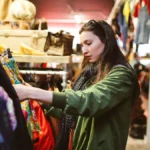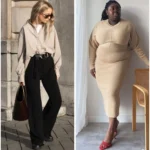Shopping ethically means making choices that reflect positive social and environmental values. In sustainable fashion, this involves supporting brands that prioritize fair wages, eco-friendly materials, and transparent supply chains.
As consumer awareness grows, the fashion industry is embracing more sustainable practices. Influential designers like Stella McCartney and organizations such as Fair Trade International are paving the way, inspiring both companies and consumers to adopt conscious consumption habits.
Why Ethical Shopping in Sustainable Fashion Matters
Choosing sustainable fashion contributes to a healthier planet and fairer working conditions for people around the world.
Policies like the Modern Slavery Act ensure that businesses work transparently and eliminate unfair labor practices. By supporting ethical brands like Patagonia, consumers actively participate in creating a positive change.
The increasing demand for sustainable products encourages companies to adopt environmentally friendly practices and shift towards a more ethical industry.
Key Components of Shopping Ethically
- Transparency in Supply Chains
- Consumers are empowered when brands share where and how their products are made. Platforms like Good On You make it easier to find trustworthy fashion labels.
- Use of Eco-Friendly Materials
- Choosing organic cotton, recycled polyester, or plant-based fabrics helps reduce environmental impact while offering stylish and comfortable clothing.
- Fair Labor Practices
- Many companies, including EILEEN FISHER, are committed to paying fair wages and fostering safe working environments, ensuring workers are treated with dignity.
- Commitment to Slow Fashion
- Slow fashion encourages thoughtful consumption, leading to wardrobes filled with timeless, high-quality pieces that last for years.
Overcoming Challenges in Ethical Shopping
With growing awareness and innovation, solutions to common challenges in ethical shopping are becoming more accessible. Here are some ways to navigate these challenges:
- Find Affordable Options
- Look for sales, second-hand shops, and clothing swaps, which offer budget-friendly ways to adopt sustainable fashion. Many brands now offer affordable, eco-conscious lines.
- Identify Authentic Brands
- Avoid greenwashing by relying on reliable platforms like Good On You, which evaluate brands transparently. Trustworthy certifications, such as Fair Trade and GOTS, are becoming more common.
- Access a Wider Range of Sustainable Products
- Online stores and rental platforms expand access to sustainable fashion, making it easier to find eco-friendly clothing no matter where you live.
- Simplify Product Lifecycles
- Many brands are adopting circular models, meaning your worn clothes can be returned and remade into new garments, reducing waste.
How the Industry is Embracing Ethical Fashion
The industry is responding positively to the call for sustainable fashion. Here are some real-world examples:
- Patagonia: A leader in environmental activism, the brand uses recycled materials in its products and encourages repair and reuse.
- Stella McCartney: A pioneer of sustainable luxury, her collections are made without animal products and promote environmental consciousness.
- H&M Conscious Collection: Demonstrating that even large brands are shifting towards sustainability, H&M offers eco-friendly collections to a global audience.
- Fashion Revolution Week: Held annually, this event drives awareness and celebrates progress towards greater transparency within fashion supply chains.
Frequently Asked Questions About Shopping Ethically
- What is ethical shopping in fashion?
- Ethical shopping is about choosing products from brands that prioritize fair labor, eco-friendly practices, and transparency. It allows consumers to make purchases that align with their values.
- How can businesses benefit from sustainable fashion?
- Companies that adopt sustainable practices enjoy improved brand reputation and customer loyalty. Meeting consumer demand for transparency also positions them competitively in the market.
- What are the easiest ways to start shopping ethically?
- Start small! Explore second-hand stores, invest in versatile pieces, and support brands with ethical certifications like Fair Trade or GOTS.
Key Takeaways for Ethical Shopping in Sustainable Fashion
- Transparency is Key: Supporting brands with clear supply chains empowers consumers and builds trust.
- Eco-Friendly Materials Matter: Choose natural or recycled fabrics to reduce your environmental footprint.
- Quality Over Quantity: Investing in well-made garments ensures a sustainable wardrobe that stands the test of time.
- Join Ethical Movements: Participate in events like Fashion Revolution Week to promote transparency in fashion.
- Stay Optimistic and Curious: With more brands embracing sustainable practices, shopping ethically is becoming easier and more exciting every day!
Sustainable fashion is a hopeful and impactful movement that invites everyone to make mindful choices. By supporting brands committed to fair labor practices and eco-friendly production, consumers become part of a positive change in the fashion industry.
Platforms like Good On You simplify the search for ethical labels, while events like Fashion Revolution Week celebrate progress and transparency.
Embrace this journey with enthusiasm and optimism—your choices matter, and together we can build a more sustainable future for fashion.







